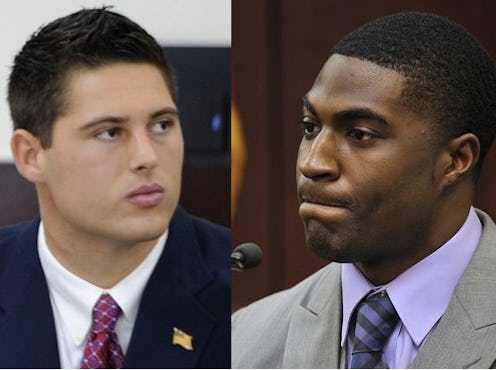News
Vanderbilt Football Players Found Guilty Of Rape

More than 18 months after a Vanderbilt student's nightmare began, a Nashville jury has found two out of the four Vanderbilt football players who allegedly took part in her rape guilty of five counts of aggravated rape and two counts of aggravated sexual battery. After 12 harrowing days of recounting increasingly disturbing evidence, the jury took just a few hours to convict Brandon Vandenburg and Cory Batey of all charges. Vandenburg, who was the survivor's boyfriend at the time, videotaped the entire incident, and has since been charged with tampering with evidence and unlawful pornography. He is said to have sent the footage to his friends before attempting to research how to delete any history of the video from his phone to avoid a criminal investigation.
According to attorneys involved in the case, Vandenburg and Batey laughed at the neuroscience major, who was heavily intoxicated and unconscious at the time, before attacking her. Prosecutors claimed that Vandenburg, who was unable to become aroused at the time, "coached" his teammates and provided direction over the course of the assault. Jaborian "Tip" McKenzie, another player who has been charged but has not yet gone to trial, said that Vandenburg was "amped" during the incident, apparently deriving some sickening pleasure out of the situation.
Batey's defense attorneys have consistently maintained that he was too drunk to be aware of his actions, and he, like the survivor, claims that he has absolutely no recollection of the entire evening. On Monday, the former football player testified, "I was just drunk out of my mind. This is something I would never do in my right state of mind. I'm just sorry."
Jurors were shown graphic video and photographs from the night of the assault, many of which were circulated among the four men accused of taking part in the attack, as well as others who received texts from Vandenburg with the footage. There was also security footage of the men dragging the unconscious survivor into an elevator then into a dorm room. Batey told jurors that another football player told him to delete the photographs the following morning, and that he was unsure of how he'd even received them. He said, "I didn't know how they got there. I didn't know what happened to the young lady in the pictures. I immediately deleted them."
Batey did admit to the jury, however, that he could identify himself as one of the men seen in the photographs, and that he took responsibility for what transpired. But when a prosecutor asked if he intended to change his plea from "not guilty" to "guilty," he replied in the negative. The 21-year-old was admitted to Vanderbilt on a football scholarship. But now, it seems that both his academic and athletic career are finished.
Defense attorneys attempted to direct blame away from Vandenburg and Batey, instead blaming the campus culture and the collegiate atmosphere of drunken, casual sex as the culprits. Somehow, according to these lawyers, a culture sexually assaulted a young woman, not individuals. During the trial, Batey was painted as the victim, one who fell prey to the dangers of peer pressure and high-risk drinking (he is estimated to have consumed between 14 and 22 drinks that evening). According to his lawyers, he was a star athlete bound for great success until he "walked into a culture that changed the rest of his life."
This absurd desire to displace guilt and somehow alleviate the onus of responsibility from the shoulders of those who have the capacity to force themselves upon women is more dangerous than any college party. Not only does a "rape culture" exist on the campuses across universities in the United States, but it also has further permeated courtrooms, supposed settings of justice in which lawyers instead make excuses for individuals who seem to have no regard for the basic human rights of their peers. Batey and Vandenburg, their lawyers said, were only children with no real awareness of right and wrong, and were fully susceptible to the whims of those around them.
There is an air of complacency that has poisoned the way in which we discuss and address rape, and though it seems that justice was served to Vandenburg and Batey in this particular case, there are far too many incidents in which sexual predators go untried, free to carry on with their lives even as their victims bear the scars of their monstrosities. And it is only compounded by the astounding lack of vigilance displayed on college campuses in the United States, where too often, students prefer not to notice questionable situations and stay silent rather than stepping in.
Footage from the assault shows that numerous people were present when the survivor was first carried, unconscious, away from a public setting. In fact, it seems that several bystanders were at least marginally aware of the situation, and yet did nothing to intervene, nor did anyone report the incident to the authorities. This nearly unbelievable attitude of ignorance is perhaps one of the most damning challenges facing American universities as they attempt to address the staggering issue of sexual assault, and is one that needs to be rectified immediately.
But despite the multiple facets of the rape culture that is so often blamed for these assaults, the fact of the matter remains that a culture does not rape — people rape. Cultures cannot be held responsible in a court of law, but individuals can, and they should. And in the case of Vanderbilt, we finally seem to be moving in the right direction.
Images: Twitter